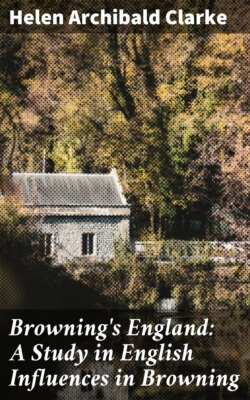Читать книгу Browning's England: A Study in English Influences in Browning - Helen Archibald Clarke - Страница 27
На сайте Литреса книга снята с продажи.
HOME-THOUGHTS, FROM THE SEA
ОглавлениеTable of Contents
Nobly, nobly Cape Saint Vincent to the North-west died away;
Sunset ran, one glorious blood-red, reeking into Cadiz Bay;
18 Bluish 'mid the burning water, full in face Trafalgar lay;
In the dimmest North-east distance dawned Gibraltar grand and gray;
"Here and here did England help me: how can I help England?"—say,
Whoso turns as I, this evening, turn to God to praise and pray,
While Jove's planet rises yonder, silent over Africa.
In two instances Browning celebrates English friends in his poetry. The poems are "Waring" and "May and Death."
Waring, who stands for Alfred Domett, is an interesting figure in Colonial history as well as a minor light among poets. But it is highly probable that he would not have been put into verse by Browning any more than many other of the poet's warm friends if it had not been for the incident described in the poem which actually took place, and made a strong enough impression to inspire a creative if not exactly an exalted mood on Browning's part. The incident is recorded in Thomas Powell's "Living Authors of England," who writes of Domett, "We have a vivid recollection of the last time we saw him. It was at an evening party a few days before he sailed from England; his intimate friend, Mr. Browning, was also present. It happened that the latter was introduced that evening for the first time to a young author19 who had just then appeared in the literary world [Powell, himself]. This, consequently, prevented the two friends from conversation, and they parted from each other without the slightest idea on Mr. Browning's part that he was seeing his old friend Domett for the last time. Some days after when he found that Domett had sailed, he expressed in strong terms to the writer of this sketch the self-reproach he felt at having preferred the conversation of a stranger to that of his old associate."
This happened in 1842, when with no good-bys, Domett sailed for New Zealand where he lived for thirty years, and held during that time many important official posts. Upon his return to England, Browning and he met again, and in his poem "Ranolf and Amohia," published the year after, he wrote the often quoted line so aptly appreciative of Browning's genius—"Subtlest assertor of the soul in song."
The poem belongs to the vers de société order, albeit the lightness is of a somewhat ponderous variety. It, however, has much interest as a character sketch from the life, and is said by those who had the opportunity of knowing to be a capital portrait.
20
